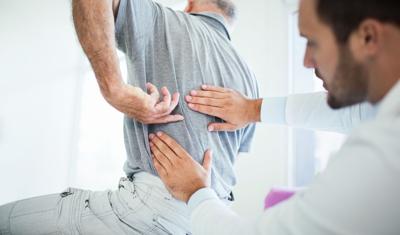
Duane W. Densler, M.D., has witnessed the transformation firsthand. The neurosurgeon/spine surgeon with Norton Neuroscience Institute has treated patients with chronic back pain and been honest about what would offer the best hope for relief—Not his scalpel, but losing weight, quitting smoking, and changing jobs. Confronted with that reality, he’s seen patients change their lives for the better.
“Once they see some improvement, it just drives them to keep going,” Dr. Densler said. “Or if they see family members who have had a very difficult time with their back, they say, ‘I'm not going to go down that road. I'm going to lose this weight, I'm going to stop smoking, I'm going to get another job.’ And they do have some success.”
Back pain is the second most common health issue among people in the U.S. after headaches, and back pain can occur at any age.
“It’s really a cradle-to-grave problem,” said John R. Dimar II, M.D., orthopedic and spine surgeon with Norton Leatherman Spine. “The muscles that support the spine are crucially important to good spine health, and not maintaining them as people age results in an acceleration of the normal degenerative processes in the spine.”
Everyone’s spine degenerates as they age. Dr. Dimar has seen it in patients as young as age 12 and adds that over one-third of 40-year-olds already have degenerative disease. In some cases, genetic issues may exacerbate the situation. But the overwhelming majority of back pain cases stem from lifestyle, and the first step toward relieving back pain is eliminating the bad habits that make it worse.
Tip 1. Lose Weight
Obesity is a major contributor to chronic back pain, and Dr. Densler first recommends that patients begin a regular exercise regimen and try to maintain a healthy weight. It also plays a crucial role in your overall health. Maintaining a healthy weight preserves a healthy heart, decreases the risk of chronic diabetes, and keeps you happy and energized overall.
“Those are things you can do before you ever consider coming to see me,” he said.
Tip 2. Quit smoking
While smoking is not a direct cause of back pain—although reduced lung capacity can make it difficult to exercise and maintain a healthy weight—smoking does affect the small blood vessels that supply blood to the spine, which can accelerate degenerative disease.
“Kentucky is unfortunately one of the top smoking states,” said Dr. Dimar, who is chief pediatric orthopedic surgeon at Norton Children's Hospital. “We always recommend our patients stop smoking, because there's a lot of literature out there that says that smokers have a significantly higher risk of degeneration and suffer from back disease than somebody who doesn't smoke.
Tip 3. Make lifestyle or career changes
“People can change their lifestyle, their weight, their smoking to effectively stave off back pain,” Dr. Dimar said. "However, there are people who, for example, if they're young and in a heavy bending and lifting job and already having back pain, might want to consider a career change. It's an ideal time to do it because of the labor market, and maybe you can get trained to do a lighter-duty job.
‘It’s all tied together.’
According to both surgeons, the goal is to take every step to try to avoid surgery—which Dr. Dimar tries to reserve for conditions such as fractures, unstable spine, and scoliosis. Less invasive measures to help with back pain can include physical therapy and rehabilitation programs, nonsteroidal medications, muscle relaxants and pain management treatments like epidural injections or trigger point injections. Patients who struggle with obesity can consider dietary consultations, bariatric surgery or newer medications that have been proven to help with weight loss.
The cornerstone of all back pain treatment is lifestyle change.
“A lot of it’s just really conditioning,” Dr. Dimar said. “People let themselves become debilitated by not strengthening their muscles, and not maintaining a healthy weight. There are so many things you can do, but the most important thing that's often missing is the fact that you need to make overall healthy body decisions during your lifetime, which will prevent you from developing back problems later. If you’re obese, you’re going to have back problems, just like you’re going to have a higher risk of diabetes. It’s all tied together.”
People with back pain often wait too long to consult with a physician, according to Dr. Densler, especially given that the root cause is often something that can be addressed.
“You can’t modify your genetics, and you can’t determine whether or not you’re going to have an injury,” he said. “But there are some factors you can modify, like weight and smoking. There are things you can do to prolong the healthy life of your spine.”
For more information about Norton Leatherman Spine, call (502) 629-2225 or visit NortonLeathermanSpine.com.
Please immediately seek care from a qualified spine health specialist if conservative care is unsuccessful or if there are persistent neurological symptoms such as leg pain, weakness, numbness or loss of bowel and bladder control.











